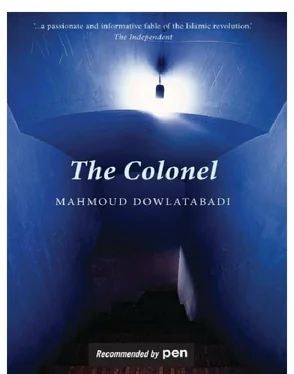Mahmoud Dowlatabadi
Mahmoud Dowlatabadi is a colossus of contemporary Iranian literature. He cut his literary teeth on the great Persian poets like Hafiz and Rumi, imbibing their rich language and blending it uniquely successfully with modern everyday speech to create his own thoroughly contemporary voice. His language is poetic, rhythmical, metaphorical, and allusive and flows like a broad, mighty river, full of eddies, side currents, quiet backwaters and whirlpools. As he puts it: ‘Words are like the strings of a guitar. You have to let their clear tones ring out and not stifle their resonance with verbs.’
Dowlatabadi began working on this novel 25 years ago, but kept filing the manuscript away in a drawer, taking it out periodically and revising it. In 2008, he finally declared the text ready for publication. He dismissed any notion that earlier publication might have changed the course of history as an unreasonable and fanciful expectation to place upon a literary work. He also feared that the novel might itself have fallen victim to the unchecked violence of the revolution.
The descriptions of torture are taken from the experiences of the author himself, or from those of his friends. It comes as no surprise to learn that The Colonel has never appeared in its original language in the author’s native country. The manuscript remains in the hands of the censor, who has demanded a number of deletions and revisions, which the author has refused to make.
Dowlatabadi was born in 1940 into a peasant family in the small village of Dowlatabad, near the town of Sabzevar on the northern edge of the Dasht-e Kavir , the great Persian desert. His early childhood memories are of carrying sacks of melons by donkey for sale in the nearest market town. ‘It was a bitter struggle between the unyielding stone and the fragile glass within me, countless shards on the dry earth, people wracked by poverty and hunger…’
Aged 13, he left his native village and fended for himself, first in Mashhad and Sabzevar and later in Tehran, as a jack-of-all-trades. While keeping himself enrolled in school, he moonlighted variously as a hairdresser, checking tickets in cinemas and selling advertising space in local newspapers. He was homeless and often spent the night on the streets. In his spare time, he devoured every book he could lay his hands on, as much from the canon of Persian classical literature as from translations of the works of European political philosophers and novelists. He describes himself as self-educated. Though he never gained his high-school diploma, he was accepted for a place at drama school and wrote his first short story, The Night’s Abyss. This launched him on his literary career.
Dowlatabadi’s first collection of stories appeared in 1969, followed by a novel Safar (The Trip) translated into German as Der Reise . Eight more novels appeared before the revolution in 1979. Dowlatabadi’s 1979 novel Ja-ye Khali-ye Soluch , translated into English as Missing Soluch , treated the decline of Iranian village life in the 1960s. This starkly beautiful novel looks at the trials of an impoverished woman and her children living in a remote village in Iran, after the unexplained disappearance of her husband, Soluch. Lyrical yet unsparing, the novel examines her life as she contends with the local political corruption, authoritarianism, and the poverty of the village. This landmark novel, which pioneered the use of the everyday language of the Iranian people, revolutionised Persian literature in its beautiful and daring portrayal of the life of a marginal woman and her struggle to survive.
Dowlatabadi’s most ambitious work, completed in 1984, is a 10-volume, 3,000-page epic entitled Kelidar , an account of life in the village of that name in north-eastern Iran in the 1940s. The village people are impoverished Kurds, who were moved there in the 17th century by Shah Abbas to guard the frontier against incursions by the Turkmen raiding from the north. Neither two years in prison under the Shah’s regime, nor the upheavals of the revolution nor the death of his much-loved father could interrupt his tireless work on this magnum opus . Its publication was a sensation and catapulted Dowlatabadi to instant fame. He noted at the time: ‘I was totally exhausted and wanted nothing so much as to take a long rest, but I was compelled to go on writing.’ Kelidar has been translated into German.
While he was writing Kelidar Dowlatabadi tried to shut himself off from events in the post-revolutionary outside world. His own politics, which evolved over time, could be loosely defined as leftward-leaning liberal nationalism. He became totally disillusioned by the outcome of the revolution that toppled the Shah: ‘I felt a great sense of unease within me, an inner compulsion that drove me to the brink of insanity.’ Then came the fateful night when everything came to a head and The Colonel was born:
‘It was a dream, or rather a nightmare. I saw all the various characters, the colonel and his children and sensed the atmosphere before and after the revolution, as the whole recent history of Iran ran like a time-lapse film before my eyes. But when I awoke, the nightmare didn’t go away. I immediately began writing down what I’d seen, if only to relieve the terrible ferment I felt churning inside me.’
Dowlatabadi now lives in Tehran. His children live in Europe and the USA. He travelled to Europe in 1990 and visited the United States in 1991, lecturing on literature and politics. In 2009 he visited Germany for the launch of the German translation of The Colonel.
The place
Readers who think of Iran as a dry country may be surprised by the constant rain in the narrative. The story unfolds in Rasht, the capital of Gilan province on the Caspian, where rice grows on the coastal plain and tea is cultivated on the foothills of the Alborz mountains, which separate the coast from the high, dry central Iranian plateau. The seaward side of the range is covered by heavy rain forest, which for centuries has given cover to bandits, rebels and dissidents. In 1920 Rasht was the base of the short-lived Socialist Republic of Gilan, under Kuchik Khan. Shortly after the revolution of 1979, the mountain forests gave cover to refugee Marxists. The time of the novel is placed towards the end of the Iran-Iraq war (1980 — 88).
The historical background
The Iranian Revolution of 1979 saw the end of the 2,500-year-old Persian monarchy. The hundreds of thousands who poured into the streets expected that the revolution would bring them better times, social justice, freedom and independence from foreign interference. The revolution was more than just a change of regime; it was also an act of revenge, the settling of a number of accounts that had been outstanding since the early years of the 20th century.
The history of modern Iran begins with the constitutional revolution of 1906, where the fault lines between the royal court, conservative clerics, liberal clerics, western-oriented liberals, nationalists and Leftists first became apparent. In this struggle between progressive and reactionary forces, the royal court emerged as the winner. The Iranian Left was born in the oilfields of Russian Baku, where most of the labourers had come north from the Iranian province of Azerbaijan to find work. These labourers were very much part of the first Russian revolution of 1905.
After World War I the British, seeing that the Bolsheviks were moving into Iran from Baku, tried to turn Iran into a protectorate, under a triumvirate of two princes and Vosuq ad-Dowleh, the brother of Ahmad Qavam, who were paid enormous sums of money to push a treaty agreeing to this through the Majlis, which never approved it. In 1921 an army colonel, Reza Khan, mounted a coup with Seyyid Zia, who became prime minister. Reza Khan became minister of war and in 1925 he became Shah. Reza Shah was an admirer first of Ataturk and later of Nazi Germany. He dragged the country into the modern age and promoted technological progress. His dictatorial reign stifled all opposition, particularly from the Muslim clergy, whom he saw as the biggest barrier to progress. He made women remove their traditional veils, while mullahs who displeased him had their turbans knocked off in the street and their beards forcibly shaved — acts of public humiliation that left deep scars and a wish for revenge.
Читать дальше












